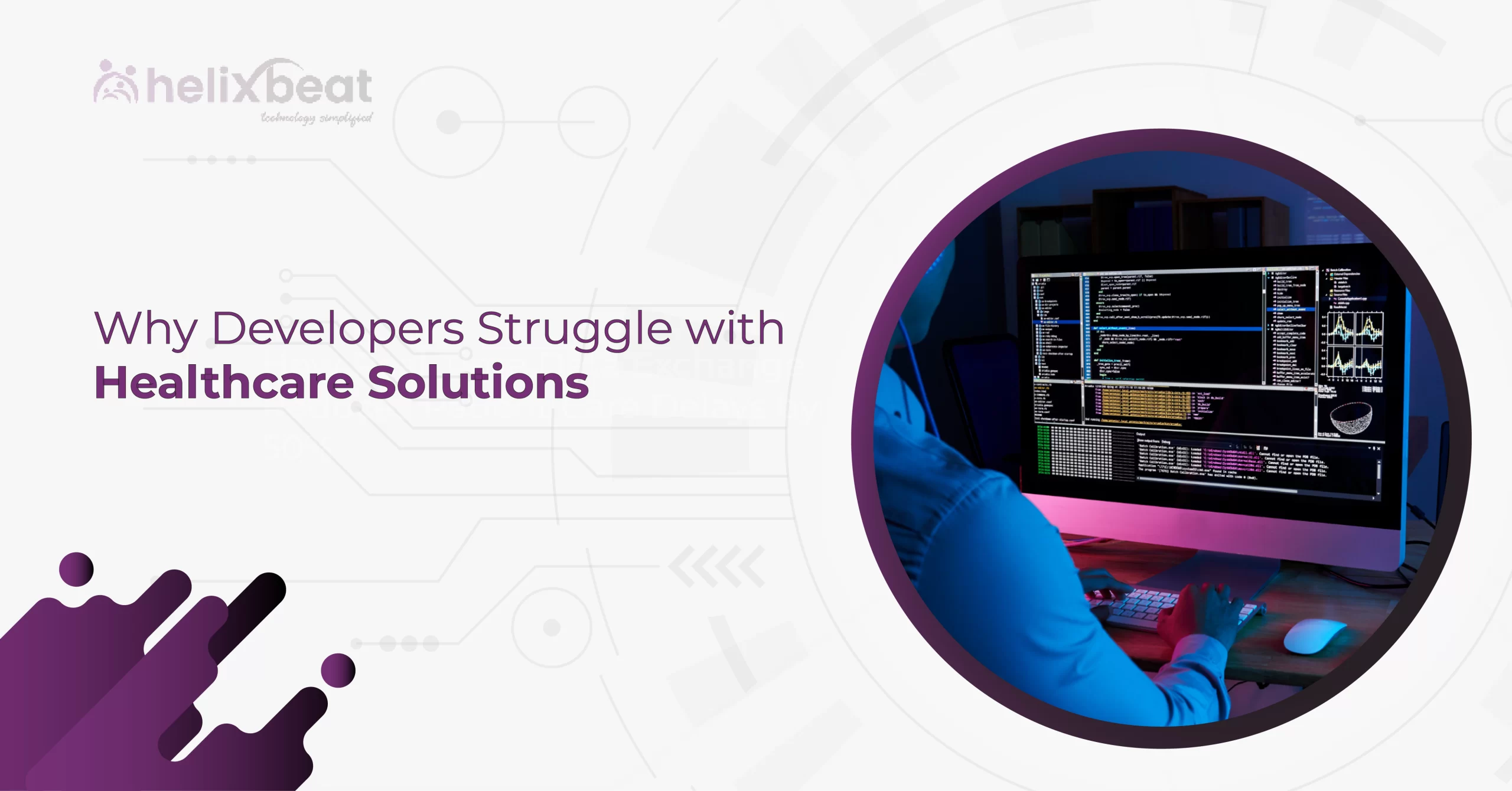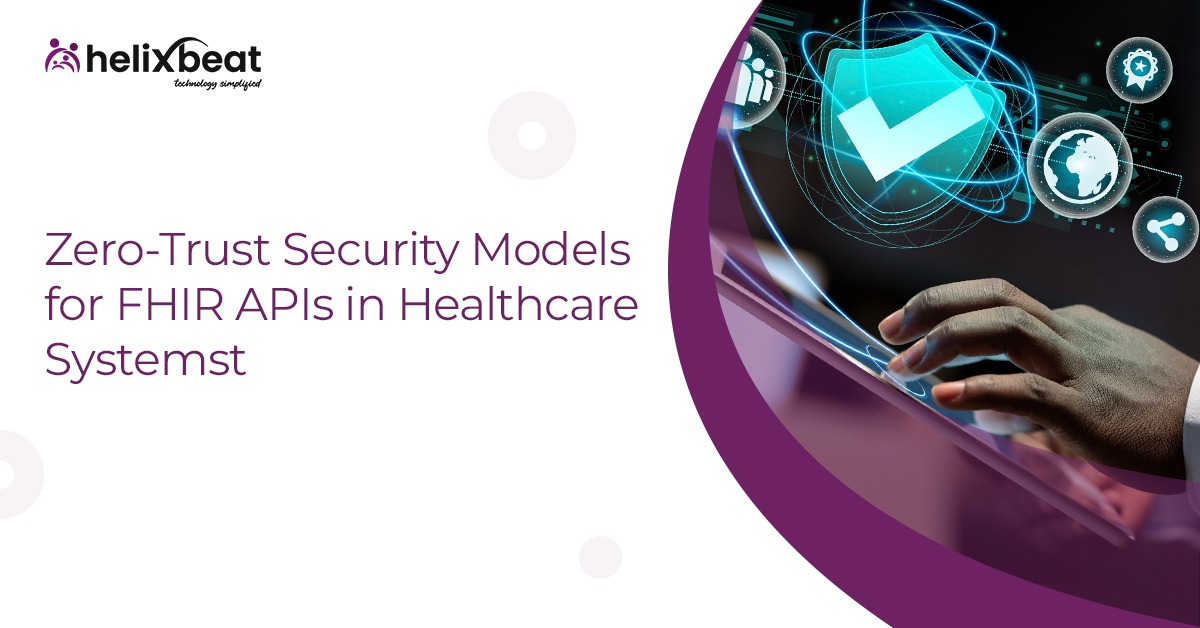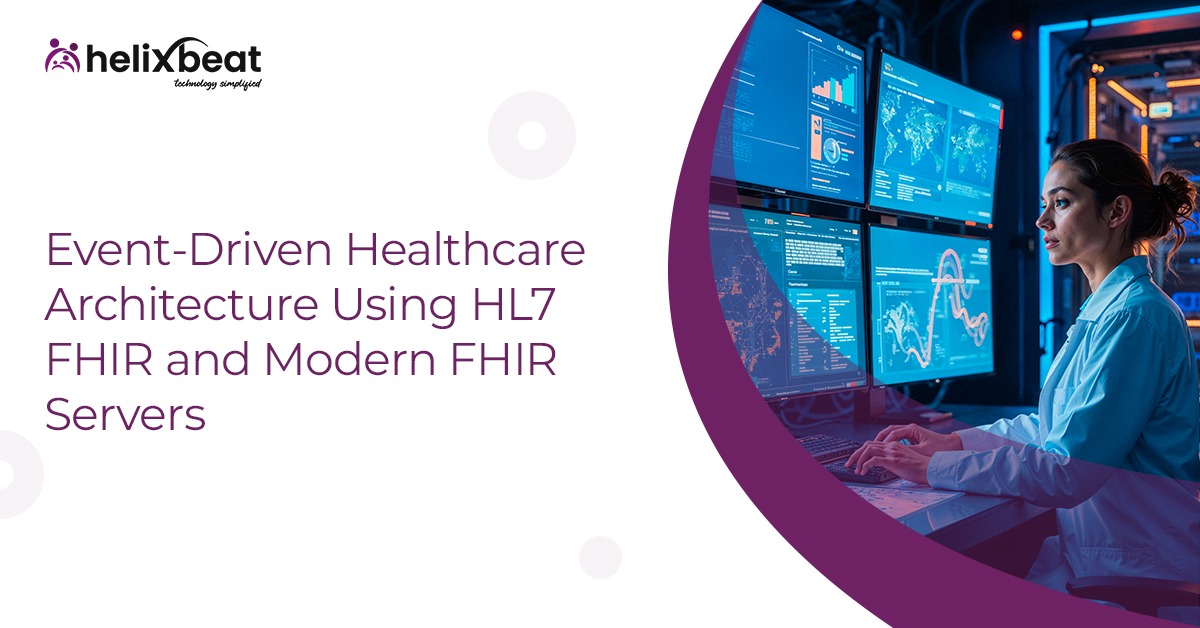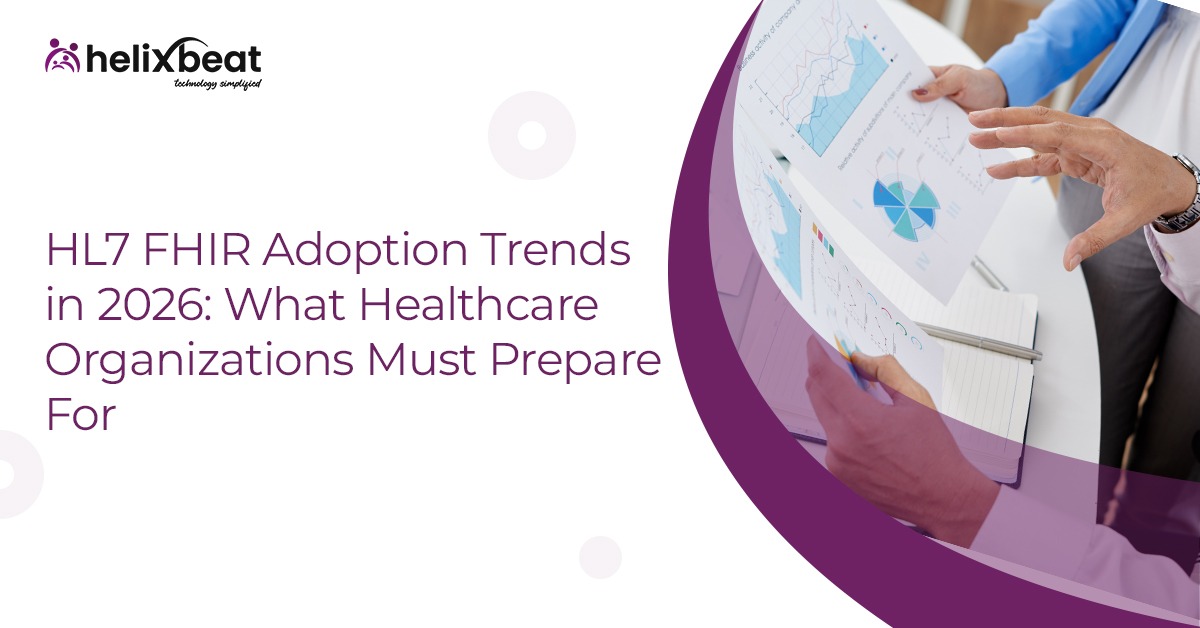Developers entering the healthcare domain often face a range of healthcare development challenges. These include meeting compliance requirements and dealing with fragmented systems. Addressing these issues is important because they affect patient outcomes, regulatory requirements, and the efficiency of care delivery.
Table of Contents
What Makes Healthcare Software Development Complex?
Developing healthcare software involves unique challenges. It requires a combination of technical expertise and an understanding of healthcare workflows to create solutions that are effective and safe.
The High Stakes of Healthcare Development
Healthcare solutions aren’t just about efficiency—they save lives. Any error in design or functionality can have far-reaching consequences, making this one of the most demanding fields for developers.
The Role of Interoperability in Healthcare
Fragmented healthcare systems hinder communication and lead to errors. Seamless healthcare software interoperability ensures that data flows accurately and securely between providers, payers, and patients.
Common Challenges Faced by Developers in Creating Healthcare Solutions
Developing healthcare solutions is no small feat. It involves addressing a wide range of technical and regulatory challenges while ensuring the solutions are practical and effective for healthcare providers. Below are some of the key challenges developers face in this demanding field.
Navigating Compliance Requirements
Developers must comply with stringent regulations such as HIPAA and CMS mandates to protect sensitive patient data. These rules ensure that patient information is handled securely and confidentially. However, meeting these standards can be both time-consuming and technically demanding, often requiring specialized knowledge in regulatory frameworks and their application to software design.
Ensuring Interoperability
Healthcare facilities often rely on a variety of systems for patient records, diagnostics, and insurance claims, each with its own platform and standards. Developers face the challenge of integrating these diverse systems to enable seamless data exchange. Effective interoperability improves care coordination and reduces errors but requires significant effort in standardization and integration.
Managing Fragmented Data
Patient data is frequently scattered across multiple systems in various formats. Consolidating this data into a unified, accessible format is a daunting task. Developers must design solutions that enable real-time access to comprehensive patient information, which is vital for informed decision-making in healthcare.
Addressing Scalability
Healthcare organizations grow and evolve, with increasing patient records and expanding operations. Developers need to create systems that can scale efficiently to handle rising data volumes and user demands without affecting performance or reliability.
Prioritizing Security
The sensitive nature of healthcare data makes it a prime target for cyberattacks. Developers must prioritize security by implementing encryption, secure access controls, and audit trails. Robust security measures protect patient data, reduce the risk of breaches, and maintain trust.
Balancing Functionality and Usability
Healthcare software must be both functional and easy to use. Developers face the challenge of delivering advanced features while maintaining an intuitive user interface, ensuring healthcare professionals can use the system effectively without extensive training.
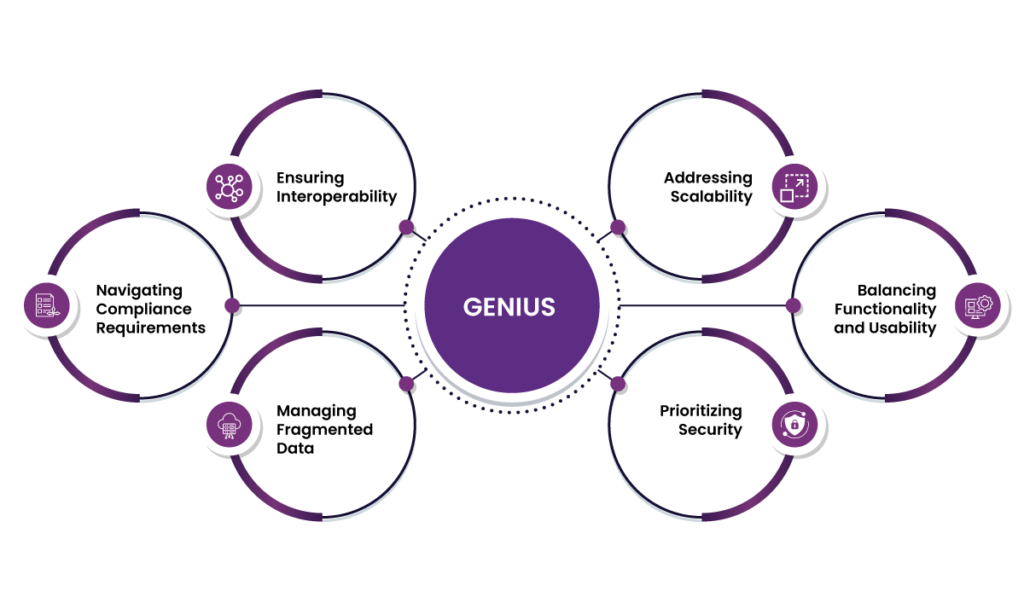
Why Interoperability Is the Key to Effective Healthcare Solutions?
Fragmented systems lead to delays, increase administrative burdens, and compromise patient safety. Without interoperability, healthcare organizations face inefficiencies and errors that can negatively impact patient outcomes.
How Interoperability Transforms Healthcare?
- Real-Time Data Access: Provides immediate access to accurate patient information for healthcare providers.
- Enhanced Collaboration: Enables seamless communication between labs, pharmacies, and providers.
- Error Reduction: Standardized data reduces errors caused by manual processes.
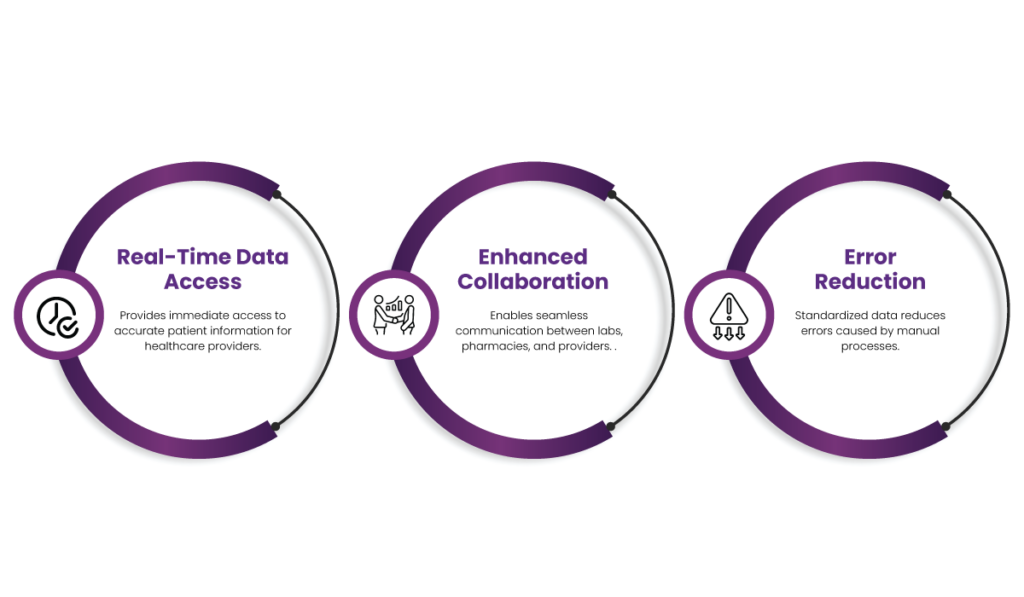
How GENIUS Simplifies Healthcare Software Development?
Developing healthcare software can be complex but GENIUS simplifies the process with its innovative features. Here’s how GENIUS addresses key challenges to help developers create effective and secure healthcare solutions.
Bridging System Gaps with Interoperability
GENIUS connects disparate systems using adaptive interoperability, ensuring seamless data exchange.
Example: A specialist accessing a patient’s lab results instantly without manual intervention demonstrates GENIUS’s ability to eliminate silos.
Standardizing Data for Accuracy
GENIUS converts diverse data formats into FHIR-compliant standards, allowing developers to create unified healthcare solutions without worrying about compatibility.
Providing Developer-Friendly Tools
GENIUS offers APIs that enable developers to structure requests and responses based on specific needs. This reduces development time and simplifies integration.
Enhancing Security and Compliance
With GENIUS, developers no longer need to worry about compliance mandates. The platform ensures adherence to HIPAA and CMS regulations.
Streamlining Claims Processing
By automating claims processing and ensuring real-time data accuracy, GENIUS reduces rejections and improves reimbursement timelines.
Strategies to Overcome Healthcare Development Challenges
Healthcare software development comes with unique hurdles, but with the right strategies, these challenges can be effectively addressed.
Here are some actionable approaches to create robust and efficient healthcare solutions.
Start with Interoperability
Choose platforms like GENIUS that provide built-in solutions for healthcare software interoperability.
Focus on Scalability
Design systems that can adapt to increasing data and user demands. Use cloud-based solutions and modular designs to future-proof your applications.
Collaborate with Healthcare Experts
Work closely with medical professionals to understand their workflows and requirements. This collaboration ensures that the software meets real-world needs.
Prioritize Security from the Start
Incorporate strong encryption, secure access controls, and regular audits to safeguard patient data.
Emphasize User-Centric Design
Test your solutions with healthcare professionals to ensure that the software is intuitive and aligns with their workflows.
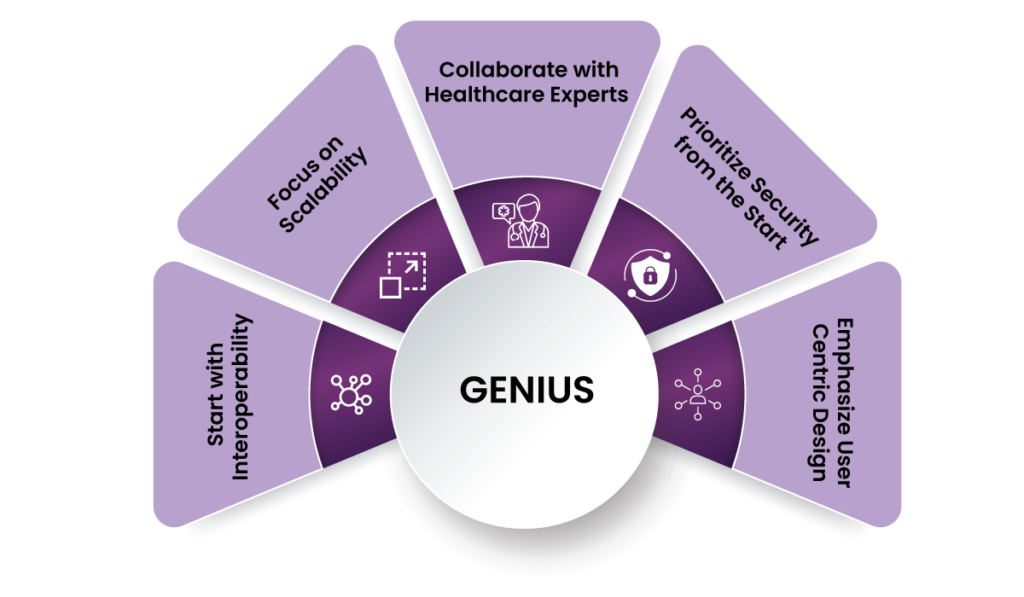
Real-World Impact- A Case Study with GENIUS
A hospital network faced significant issues with fragmented systems that delayed patient care and increased administrative workload. Developers struggled to integrate these systems while ensuring compliance with regulatory standards.
The Solution
The network adopted GENIUS to tackle these challenges by:
- Connecting systems through adaptive interoperability.
- Standardizing data into FHIR-compliant formats.
- Automating claims processing for faster reimbursements.
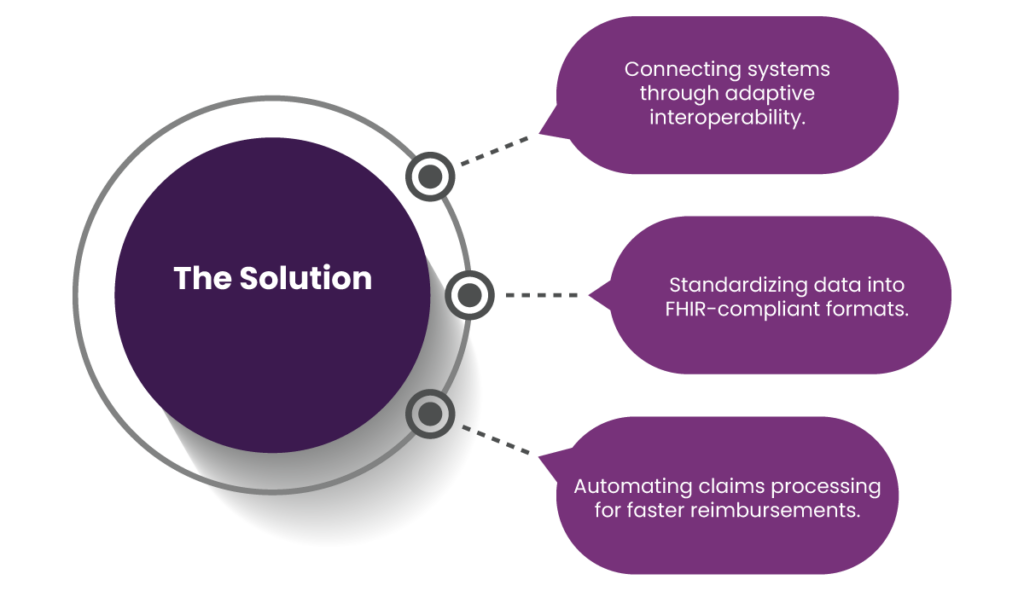
The Outcome
- 95% faster record sharing.
- 80% reduction in administrative workload.
- Improved patient care and enhanced collaboration among providers.
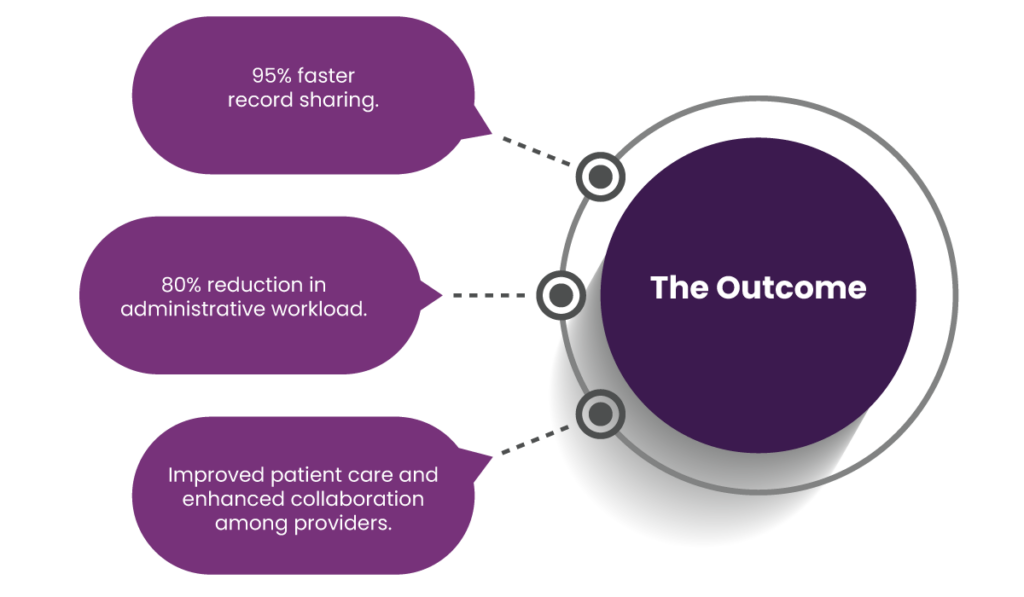
Why Should Developers Consider GENIUS?
Developers should consider GENIUS because it simplifies the complexities of healthcare software development. With built-in compliance features, GENIUS ensures adherence to critical regulations like HIPAA and CMS easing the compliance burden on developers. Its seamless data integration capabilities enable real-time sharing and standardization across diverse healthcare systems, addressing interoperability challenges effectively.
Additionally, GENIUS offers scalable solutions that can handle increasing data volumes and user demands, making it an ideal choice for dynamic healthcare organizations. By addressing key challenges like compliance, integration, and scalability, GENIUS empowers developers to create robust, efficient, and future-proof healthcare solutions.
Final Words
Building healthcare software is undeniably challenging, but it doesn’t have to be overwhelming. By leveraging the right tools and strategies, developers can create scalable, secure, and interoperable solutions that make a real impact. GENIUS stands out as a platform that simplifies the most difficult aspects of healthcare development, from interoperability to compliance.
If you’re ready to tackle the complexities of healthcare software, GENIUS is your trusted partner. Let it help you build solutions that truly transform patient care and provider workflows.
FAQs
What makes healthcare development so challenging?
Developers face issues like compliance requirements, fragmented data, and scalability needs, which are unique to the healthcare industry.
Why is interoperability important in healthcare software?
Interoperability ensures seamless data exchange between systems, reducing errors and improving care delivery.
How does GENIUS help developers?
GENIUS provides APIs, built-in compliance features, and data standardization tools, simplifying healthcare software development.
What is the biggest challenge in managing healthcare data?
Fragmented data stored in incompatible formats makes it difficult to create a unified, accessible system.
What is FHIR, and why is it important?
FHIR (Fast Healthcare Interoperability Resources) is a standard for exchanging healthcare information electronically, ensuring compatibility across systems.
Can GENIUS handle compliance requirements?
Yes, GENIUS ensures adherence to HIPAA and CMS regulations, reducing the compliance burden on developers.
How does GENIUS improve scalability?
GENIUS is built to handle increasing data volumes and user demands, making it ideal for growing healthcare organizations.
Why is data security critical in healthcare software?
Protecting sensitive patient information prevents legal issues, financial losses, and loss of trust.
How does GENIUS help reduce errors in healthcare software?
GENIUS standardizes data and ensures interoperability, minimizing errors caused by manual processes or fragmented systems.
What is the role of APIs in GENIUS?
GENIUS’s APIs allow developers to customize solutions and integrate them seamlessly with existing systems.



